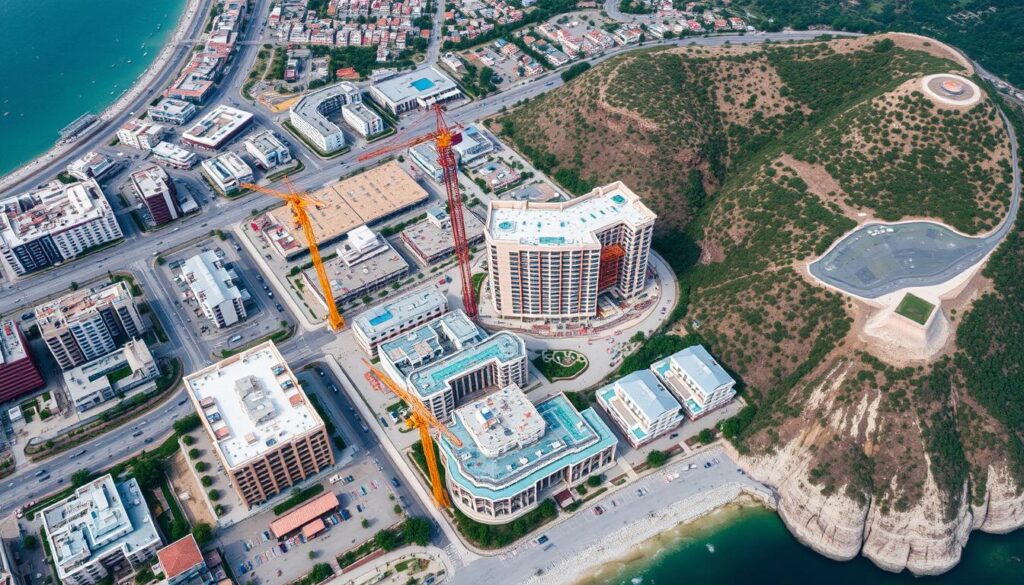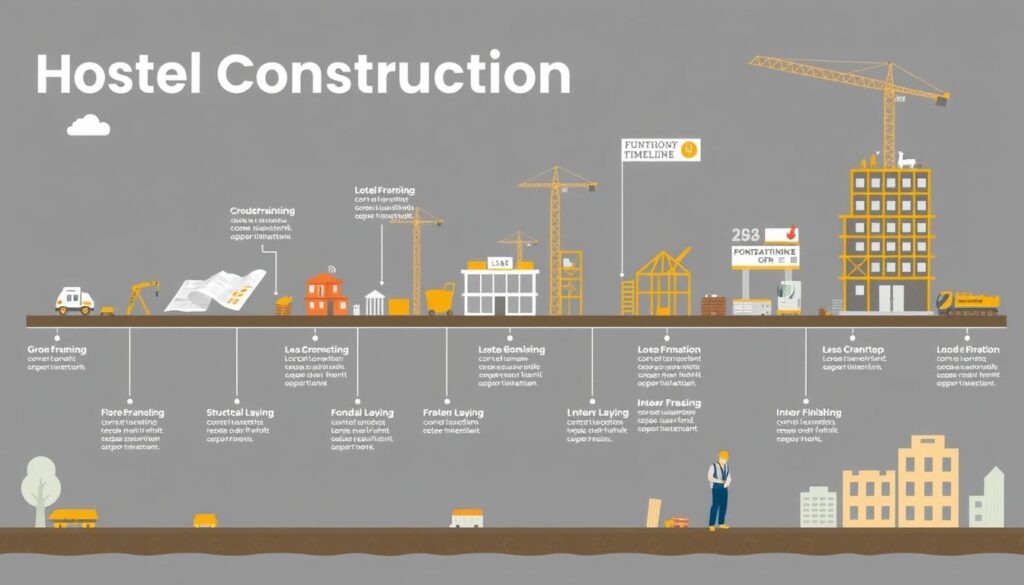Building a hotel is a big job that needs careful planning and a lot of money. The hotel industry is always changing. Knowing what affects hotel building costs is key for investors, developers, and experts. This guide will help you understand the costs of building a hotel in 2024.

Key Takeaways
- The cost to build a hotel can change a lot. It can be from $75,000 to $600,000 per room. This depends on where it’s located, what kind of property it is, and the amenities.
- The main costs are buying land, materials, and labor. These are the biggest parts of the expenses.
- Things like the hotel’s size, if it’s part of a brand, and the design and tech used can also affect the cost.
- Getting money for the project, like loans or investors, is important. It helps figure out if the project will make money.
- Good project management and planning are key. They help keep costs down and make sure the hotel is finished on time.
Understanding Hotel Construction Basics
Building a hotel is a big job that needs a good grasp of different hotel types, key construction parts, and careful planning before starting. These basics are the foundation for a hotel project to succeed.
Types of Hotel Properties
The hotel world has many kinds of properties, each with its own design, build, and how-to-run-it needs. Some common types are:
- Full-service hotels
- Limited-service hotels
- Boutique hotels
- Resorts
- Extended-stay hotels
Key Construction Components
Building a hotel involves many important parts, like the building’s structure, mechanical systems, and finishes. Key components include:
- Foundations and framing
- Plumbing, electrical, and HVAC systems
- Exterior cladding and roofing
- Interior walls, floors, and ceilings
- Elevators and escalators
Initial Planning Considerations
Before starting construction, hotel developers must think about several planning steps, such as:
- Choosing the right site and meeting zoning rules
- Understanding the market demand and if it’s a good idea
- Looking at financing options and making a budget
- Designing the architecture and engineering
- Getting all the needed permits and approvals
Knowing these basic hotel construction points is key for a project to go smoothly and be a success.
Average Hotel Construction Costs Per Room in 2024
Building a hotel can cost a lot, and the price per room varies. As we start 2024, knowing the average costs for hotel rooms is key. This helps with budgeting and planning. We’ll look at the typical per-room construction costs for different hotel types.
The average 2024 hotel building rates for a mid-scale hotel are between $150,000 and $300,000 per room. This range shows how many things can change the cost, like where the hotel is, what it has, and who it’s for. Luxury hotels, aiming for high-end guests, can cost $300,000 to $500,000 per room.
Keep in mind, these numbers are just estimates. The real cost can change a lot. Things like where the hotel is, the cost of labor and materials, and how unique it is can all affect the price. Hotel owners need to think about these things to make a budget that works.
| Hotel Class | Average Per-Room Construction Costs (2024) |
|---|---|
| Economy | $100,000 – $150,000 |
| Midscale | $150,000 – $300,000 |
| Upscale | $250,000 – $400,000 |
| Luxury | $300,000 – $500,000 |
Knowing the 2024 hotel building rates and hotel room expenses helps hotel owners plan better. They can get the right funding and make smart choices for their projects.
How Much Does It Cost to Build a Hotel: Complete Breakdown
Building a hotel is a big project with many costs. We’ll look at three main parts: land costs, materials and labor, and permits and legal fees.
Land Acquisition Expenses
The land cost is a big part of the budget. The location, size, and zoning affect this cost. The local market, land availability, and site prep also play a role.
Construction Materials and Labor
Materials and labor costs make up a big part of the budget. This includes building materials and the people needed to build the hotel. The hotel’s type, size, and design impact these labor expenses.
Permits and Legal Fees
Getting permits and dealing with legal stuff is key. Permit fees, zoning approvals, and legal advice add to the cost. The needs vary by location and project complexity.
Knowing these costs helps hotel developers plan better. It ensures their project is successful and financially sound.
Location Impact on Hotel Building Costs
The location of a hotel greatly affects its construction costs. The differences between urban and rural areas can significantly change the budget. This is due to geographical cost variations.
Land prices are a big factor. In cities, land is expensive. But, in rural areas, it’s cheaper. The cost of materials and labor also varies by location. Cities usually have higher costs than rural areas.
Geographical cost variations play a big role. Some areas have higher taxes and stricter building codes. This can increase construction costs. But, other areas might have lower costs and a better construction industry.
Choosing between urban and rural locations also affects costs. Urban hotels need more complex infrastructure. This can raise construction costs. Rural hotels might have lower costs for land and labor. But, they face challenges like accessibility and finding skilled workers.
In conclusion, the location of a hotel is very important. It affects the project’s financial success. By understanding the differences in costs between urban and rural areas, developers can make better choices. This helps them stay within budget and increase their returns.

Interior Design and Furnishing Expenses
When building a hotel, the cost of interior design and furnishings is key. It affects the overall budget. Designing rooms and common areas is vital for a hotel’s success.
Room Furnishing Costs
Furnishing hotel rooms is crucial for a comfortable stay. Costs include beds, nightstands, and more. The price depends on the hotel’s style and luxury level.
Common Area Design Budget
Hotels also need to design inviting common areas. This includes lobbies, restaurants, and meeting spaces. Costs cover furniture, artwork, and more, to enhance the hotel’s look and feel.
Technology Integration Expenses
Today, hotels must integrate modern technology. This includes in-room systems and wireless connectivity. It’s important for a good guest experience and efficient operations.
Planning for these expenses helps create a unique hotel experience. It meets the needs of today’s travelers.
Hidden Costs and Additional Expenses
Building a hotel is a big job with many costs. It’s not just about buying land, materials, and hiring workers. There are hidden costs that can surprise you and change your budget. Planning ahead and setting aside extra money are key to a successful hotel project.
Unexpected hotel costs are common. These can be change orders, environmental checks, or site problems that need extra work. Doing a good site check and planning well can help. But, it’s smart to save some money for contingency budgeting for the surprises.
Another cost to watch out for is additional construction expenses. These include permits, legal fees, and following rules. Also, think about the cost of setting up roads, utilities, and public areas. These can add up fast and change your budget.
| Expense Category | Typical Range |
|---|---|
| Unexpected Hotel Costs | 5-15% of total budget |
| Contingency Budgeting | 10-20% of total budget |
| Additional Construction Expenses | 3-10% of total budget |
By thinking ahead and planning for these costs, hotel builders can make a better budget. This helps avoid surprises during the building process. Good planning and managing risks are crucial for a hotel project to succeed.
“Effective contingency planning is the key to managing the hidden costs and risks associated with hotel construction. It’s not just about the initial investment, but the long-term viability of the project.”
Financing Options and ROI Expectations
Building a hotel requires careful financial planning. It’s important to find the right financing and understand the potential return on investment (ROI). We’ll look at different loan types, return timelines, and key risks.
Loan Types Available
Developers can choose from bank loans, commercial real estate loans, and hotel financing products. Each has its own terms, interest rates, and requirements. It’s crucial to weigh the pros and cons of each to find the best fit for your project.
Expected Return Timelines
The time it takes to see returns on a hotel investment varies. It depends on location, market conditions, and project execution. Some hotels may return quickly, while others may take longer. It’s important to do thorough market research and financial planning to set realistic goals.
Risk Assessment Factors
- Competition in the local market
- Fluctuations in consumer demand and travel trends
- Regulatory changes and local government policies
- Construction and operational costs
- Management team experience and expertise
Understanding the risks of a hotel investment is key to making smart decisions. By evaluating these factors, you can prepare for challenges and opportunities. This ensures your hotel project has a good chance of success.
| Loan Type | Interest Rates | Loan Terms | Collateral Requirements |
|---|---|---|---|
| Commercial Real Estate Loan | 5% – 8% | 10 – 25 years | Hotel property |
| SBA 504 Loan | 4% – 6% | 10 – 20 years | Hotel property and other business assets |
| Hotel Franchise Financing | 6% – 10% | 5 – 15 years | Hotel franchise agreement and property |
By understanding financing options, return timelines, and risks, investors and developers can make informed choices. This maximizes the chance for a successful and profitable hotel project.
Timeline and Project Management Considerations
Building a hotel is a big job that needs careful planning and action. Knowing the usual hotel construction timeline and using good project management is key to a successful hotel project.
The hotel construction timeline changes based on the project’s size, location, and how complex it is. But, most projects go through a set of phases:
- Choosing the site and buying the land
- Designing and planning the architecture
- Getting permits and approvals
- Preparing the site and starting construction
- Building the foundation and structure
- Installing MEP (mechanical, electrical, and plumbing) systems
- Finishing the inside with furniture and decor
- Doing the landscaping and outside work
- Testing, checking, and final inspections
- Opening the hotel and handing it over
Good project management is vital to manage these phases well. It helps keep the hotel construction scheduling on track. Important things to think about include:
- Creating a detailed project plan with key milestones
- Working closely with architects, contractors, and suppliers
- Keeping an eye on progress and finding any problems
- Having strong plans to deal with unexpected issues
- Keeping everyone involved in the project well-informed
By knowing the usual hotel construction timeline and using effective project management methods, hotel builders can make their projects more efficient and cost-effective. This way, they can provide top-notch hospitality to their guests.

Conclusion
Building a hotel is a complex task that needs careful planning and budgeting. It involves many factors, from buying land to designing the interior. The cost can change a lot based on the project’s size, location, and needs.
We’ve looked at what affects hotel construction costs in 2024. This includes the type of property, the cost per room, and the location. We also talked about hidden costs and extra expenses that can affect the budget. Hotel developers must think about financing and the return on investment too.
The hotel industry is always changing. It’s important for developers and investors to keep up with new trends and technologies. By using new ideas, hotel builders can make sure their projects are competitive and profitable in the future.
FAQ
What are the typical types of hotel properties?
Hotels come in many types. You have full-service hotels, limited-service hotels, boutique hotels, resort hotels, and extended-stay hotels. Each type has its own building needs and costs.
What are the key construction components for building a hotel?
Building a hotel involves several key parts. These include the foundation, framing, and exterior cladding. You also need plumbing, electrical, HVAC systems, elevators, and interior finishes.
What initial planning considerations are crucial for hotel construction?
Planning is key when building a hotel. You need to pick a site, check zoning and permits, and do market analysis. Feasibility studies, financing options, and project management strategies are also important.
What are the average hotel construction costs per room in 2024?
Hotel construction costs vary. In 2024, they can be from $150,000 to $500,000 or more per room. This depends on the hotel’s class, location, and amenities.
What are the major cost components in hotel construction?
Hotel construction costs have several main parts. These include land, materials and labor, permits, and legal fees. You also have interior design, furnishings, and hidden costs and contingencies.
How does the location impact hotel construction costs?
Location greatly affects costs. Urban areas, prime markets, and regions with high labor and material costs tend to have higher construction costs.
What are the typical costs associated with hotel interior design and furnishings?
Interior design and furnishings can cost a lot. Costs range from $30,000 to $100,000 or more per room. This depends on luxury level, common area design, and technology.
What are some hidden costs and additional expenses in hotel construction?
Hidden costs can add up. These include change orders, regulatory compliance, environmental remediation, and unexpected site conditions. These can greatly affect your budget.
What financing options are available for hotel construction projects?
There are several financing options. You can get bank loans, commercial mortgages, equity investments, or specialized hotel development financing programs. Each option has its own terms and risks.
How long does a typical hotel construction project take, and what are the key project management considerations?
Hotel construction projects can take 18 to 36 months. Key project management includes planning the timeline, coordinating stakeholders, managing risks, and ensuring quality.



